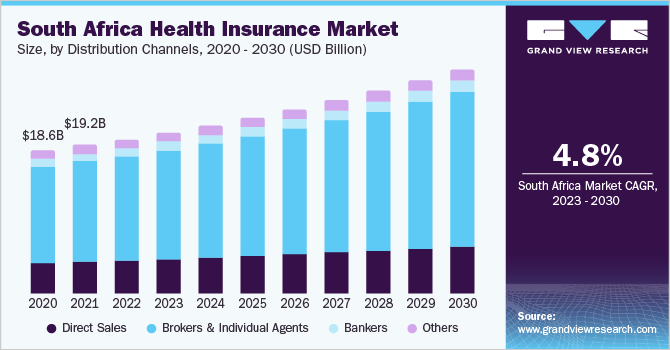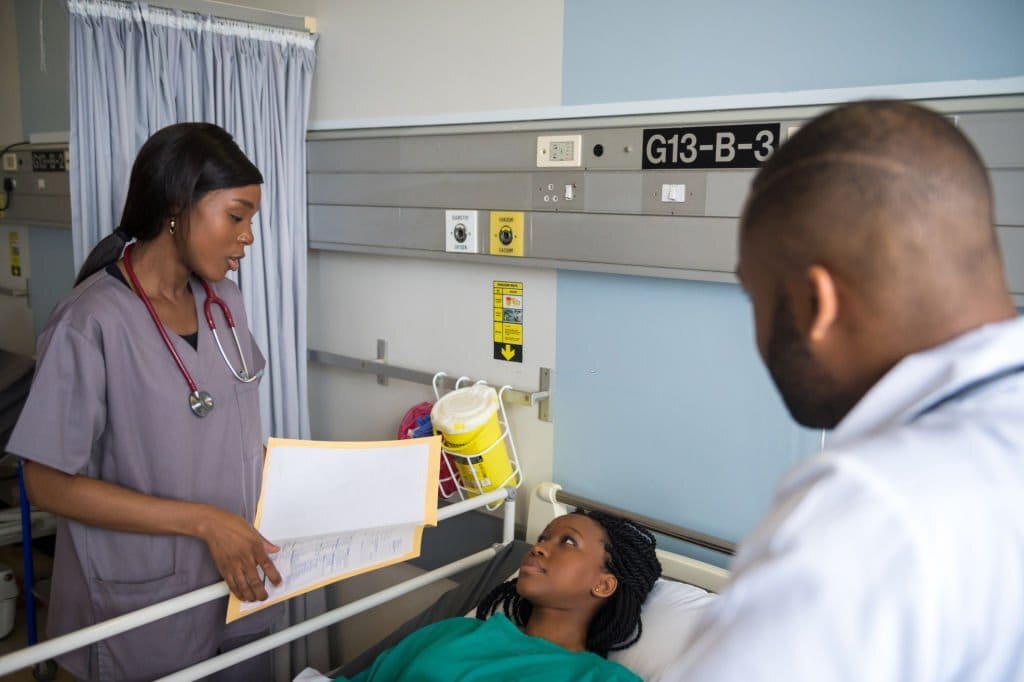In Summary
- The health insurance in Africa is projected to reach a market size of $28.96 billion by the end of 2025, according to Statista.
- Reports indicate that the average spending per capita in the health insurance market in Africa is estimated to be $21.78 in 2025.
- With an annual growth rate (CAGR 2025-2029) of 3.23%, the gross written premium is anticipated to result in a market volume of US$32.88bn by 2029.
- In global comparison, the United States is projected to generate the highest gross written premium of US$1.8tn in 2025.
- The Middle Eastern and African health insurance market, valued at $139.96 billion in 2024, is projected to reach $227.09 billion by 2030, growing at a 8.4% CAGR.
Deep Dive!!
As Africa’s healthcare landscape continues to evolve, the role of health insurance in driving economic development and improving public health outcomes has become increasingly significant.
According to reports, the African health insurance market is poised for substantial growth, with projections estimating the market size will reach approximately $28.96 billion by the end of 2025. This growth reflects the increasing recognition of health insurance as a critical tool for enhancing access to healthcare, reducing out-of-pocket expenses, and improving overall health outcomes across the continent.
With an estimated average spending per capita of $21.78 in the health insurance sector by 2025, African countries that have successfully integrated health insurance models are seeing notable benefits in terms of economic resilience and improved quality of life for their citizens.
In this report, we provide an in-depth analysis of the top 10 African countries leading the way in health insurance market development, examining how their policies and reforms are driving positive economic and health outcomes.

10. Botswana
Botswana’s healthcare system is predominantly public, with the government operating about 98% of medical facilities across the country. The health system is structured around a decentralized model, where primary healthcare services are integrated within hospital systems to ensure accessibility in both urban and rural areas. Citizens benefit from highly subsidized health services, with general check-ups costing around 5 Pula (approximately $0.50), and medical services for children under five and senior citizens over 65 being free of charge.
The government’s substantial investment in healthcare infrastructure is evident in the expansion of district hospitals and health centers across the country. Although private healthcare options exist, they cater to a smaller segment of the population, with public healthcare remaining the cornerstone of Botswana’s health delivery system. Botswana’s health insurance market, while still evolving, is supported by the government’s commitment to providing affordable and equitable healthcare, demonstrating a robust public-private healthcare model.
9. Mauritius
Mauritius is a standout example of a successful universal healthcare model in Africa. The country offers free medical treatment at public hospitals and clinics for all citizens, supported by the government’s substantial investment in healthcare infrastructure. The public healthcare system is complemented by private healthcare providers that serve those who can afford to pay out-of-pocket or wish to access faster services.
The government has also made strategic investments in medical education, with free tertiary education in medicine, ensuring a steady supply of trained professionals. This commitment has led to high health outcomes in the country, including improved life expectancy and reduced infant mortality rates. While the public system serves the majority, the private health insurance market is slowly growing, providing a dual system that ensures broad access to healthcare services for all socioeconomic groups.
8. Rwanda
Rwanda’s healthcare system is best known for its innovative and successful community-based health insurance program, Mutuelle de Santé. This program has achieved over 90% population coverage, providing affordable health insurance to the country’s population. The government’s substantial investment in healthcare infrastructure has allowed for the expansion of primary care services and rural health centers, ensuring that even the most remote areas are covered.
Rwanda’s focus on preventive healthcare and reducing out-of-pocket expenses has made it a model for other African countries looking to enhance access to healthcare. The government has committed to increasing healthcare spending and ensuring that health insurance reaches every citizen, and its progress has been recognized globally as one of the most successful health insurance schemes in Africa.
7. Tunisia
Tunisia has a strong public healthcare system that is supported by the National Health Insurance Fund (Caisse Nationale d’Assurance Maladie). This system provides citizens with low-cost medical care, including exemptions for those in the lowest-income brackets, ensuring broad access to health services. The government has invested heavily in healthcare infrastructure, focusing on building and modernizing hospitals and clinics across the country.
While Tunisia has a relatively small private healthcare market compared to some other African countries, it provides quality care for those who can afford it. The public system remains the backbone of the healthcare system, ensuring that even the most vulnerable populations are covered. Tunisia’s approach to healthcare is characterized by its commitment to universal coverage and the continuous expansion of its health insurance schemes.
6. Algeria
Algeria’s healthcare system is primarily publicly funded, offering free healthcare services to its citizens. The government has invested heavily in expanding and modernizing healthcare facilities, focusing on improving the quality of care and service delivery. The public system is the most widely used by the population, but the private sector is gradually growing, particularly in urban areas.
Despite challenges such as underfunding and regional disparities in service delivery, Algeria has made significant progress in improving healthcare access. The government’s continued focus on infrastructure development, along with efforts to reduce out-of-pocket expenses for citizens, places Algeria among the top African countries for health insurance maturity.
5. Egypt
Egypt is in the process of transforming its healthcare system with the introduction of a new universal health insurance law aimed at providing comprehensive coverage for all citizens. This move is part of a broader healthcare reform plan that also includes expanding healthcare infrastructure, improving medical services, and enhancing health insurance access.
The National Health Insurance Scheme (NHIS) is being rolled out in phases, starting with certain governorates before expanding nationwide. The government is also working to address challenges such as rising healthcare costs and the need for a more efficient healthcare delivery system. Egypt’s ambitious plan to improve its healthcare system reflects a commitment to reducing out-of-pocket expenses and expanding coverage for its population.
4. Kenya
Kenya has made significant strides in the development of its health insurance market. The government has expanded the National Hospital Insurance Fund (NHIF) to cover more citizens, and efforts to enhance access to healthcare services have been strengthened with the use of mobile technology and digital platforms.
Mobile insurance schemes, like M-TIBA, have been key in improving accessibility for low-income populations. Kenya’s private health insurance market is also growing, driven by a rising middle class that is seeking better healthcare services. Despite these advances, challenges remain, such as underfunded public health facilities and high out-of-pocket expenditures for many citizens. However, the government’s focus on expanding the NHIF and improving healthcare delivery has positioned Kenya as a leader in East Africa in terms of health insurance maturity.
3. Morocco
Morocco has been a leader in healthcare reform in North Africa, particularly with its efforts to extend universal health coverage. The government has invested in healthcare infrastructure, including the expansion of hospitals and clinics, to improve the accessibility and quality of care for its citizens. Morocco’s universal health insurance plan aims to provide coverage for all citizens, and the government is committed to implementing this plan in phases.
With a growing private health insurance market and increasing government spending, Morocco is well on its way to achieving universal healthcare coverage. This ambitious goal, alongside the country’s focus on improving healthcare outcomes, places Morocco among the top African countries with a mature health insurance market.
2. Nigeria
Nigeria is undergoing a significant transformation in its healthcare system, driven by the National Health Insurance Scheme (NHIS) and a broader push to expand access to healthcare. While challenges persist, such as inadequate infrastructure, underfunding, and a large informal economy that makes insurance coverage difficult, the government has made strides in increasing health insurance penetration. Private health insurance is growing, particularly in urban areas, with companies offering comprehensive coverage plans.
Additionally, the government is working to implement reforms that will reduce out-of-pocket expenses and improve healthcare quality. Despite challenges, Nigeria’s efforts to expand health insurance access and improve service delivery make it one of the most dynamic healthcare markets in Africa.
1. South Africa
South Africa boasts the most mature health insurance market in Africa, with a well-established private sector and a comprehensive public health system. The country has a dual healthcare system: a strong public healthcare system for the majority of the population and a private healthcare sector for those who can afford it.
Approximately 14.7% of the population is enrolled in medical aid schemes, while the majority rely on public healthcare or out-of-pocket payments. South Africa’s health insurance market is characterized by high levels of competition, with a variety of private insurers offering extensive coverage options. The government continues to work towards achieving universal health coverage, aiming to provide equitable access to quality healthcare services for all citizens. The private sector’s involvement in healthcare, alongside government efforts to expand the public healthcare system, ensures that South Africa remains the leader in health insurance maturity in Africa.
https://www.africanexponent.com/top-10-most-mature-health-insurance-markets-in-africa-2025/


